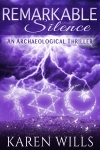 By Janice McCaffrey
By Janice McCaffrey
I recently read Mothering Sunday: A Romance by Graham Swift and found thoughts, for the novice writer that I am, to ponder. The narration on page one hundred twenty-eight says: “She would become a writer, and because she was a writer, . . . be constantly beset by the inconstancy of words.”
To me words are the magic that transforms symbols (letters) into meaningful visuals (the movie that plays in my head). I’ve always found comfort, maybe even safety, in knowing the meaning of words; and believing them fixed. Words have always anchored me to truth and reality. Can there really be inconstancy in words?
Synonyms for inconstancy include moody, capricious, vacillating, wavering; undependable, unstable, unsettled, uncertain; mutable, volatile and fickle. All point to frequent changes which of course gives every word mercurial meanings. So, I wondered, how do writers choose words that will correctly convey their intended meaning?
According to I.A. Richards, a semantics theorist, meaning is personal. He said “Words don’t mean things; people do.” His theory says that life experiences give words their meanings more than dictionaries. And he saw emotive language as the chief source of linguistic confusion. In other words, before two people can know for sure what a word used between them means they have to have the same life experiences around the word. This, as we know, is pretty much impossible.
Em Griffin uses the word “love” to illustrate Richards’ concept. In Chapter 5 of A First Look at Communication Theory Griffin explains that everything a person feels and visualizes when they hear the word love defines it for them. So if cuddling in front of a cozy fire is one person’s idea of love and their partner’s idea is having a rough and tumble snowball fight, there’s going to be linguistic confusion. And the familiar refrain, “If you loved me, you’d (fill in the blank). Based on Richards’ Meaning of Meaning, the simple word “love” has as many meanings as there are people. And the partners’ feelings and ideas associated with the word may be polar opposites depending on their life experiences.
Based on my personal experience with “linguistic confusion while using emotive language” I believe Richards’ view. But that leaves me in my quandary about finding words that express common meanings to the masses. Thinking this over, led me to recall book club discussions where members have discovered that they actually enjoyed a book more after listening to others’ perceptions of it. Because we’ve lived through similar, but not exact situations we’ve set up different connotations for the same words. And therefore, give them different meanings, feelings, pictures, and understandings; that’s why listening to understand is so important. But that’s a topic for another day.
So is there no way to be sure our writing is understood? I guess not. Maybe all we can do, as Mr. Griffin suggests, is string four or five common words together “instead of relying on a single esoteric term that could easily be misinterpreted.”
Back to Graham Swift and his protagonist, Jane Fairchild, successful novelist. During an interview she says, “Well, you have to understand that words are only words, just bits of air . . .”
But are they?
Mothering Sunday: A Romance, Graham, Swift, Alfred A. Knopf, 2016
The Meaning of Meaning of I.A. Richards. A First Look at Communication Theory, Chapter 5, by Em Griffin, 3rd Edition, McGraw-Hill, 1998. afirstlook.com
 I wanted the word ‘river’ in the title of my novel, River with no Bridge that will be out this summer.
I wanted the word ‘river’ in the title of my novel, River with no Bridge that will be out this summer.  It’s another word with connotations of nature and crossings. The sequel I’m working on will be Garden in the Sky. That was the name of a popular campfire during the time of construction of the Going-to-the-Sun or Transcontinental Highway in Glacier National Park. The road figures in the story. I also think ‘Garden’ and ‘Sky’ have strong connotations.
It’s another word with connotations of nature and crossings. The sequel I’m working on will be Garden in the Sky. That was the name of a popular campfire during the time of construction of the Going-to-the-Sun or Transcontinental Highway in Glacier National Park. The road figures in the story. I also think ‘Garden’ and ‘Sky’ have strong connotations.

 second book in that series, Bigfoot Returns, may be a bit better than the first. I always learn by doing, and bless my computer that helps me with spelling, punctuation and making sense of the story. It’s a far cry from whacking one key at a time on an old Underwood.
second book in that series, Bigfoot Returns, may be a bit better than the first. I always learn by doing, and bless my computer that helps me with spelling, punctuation and making sense of the story. It’s a far cry from whacking one key at a time on an old Underwood.



 & Feather Art
& Feather Art 